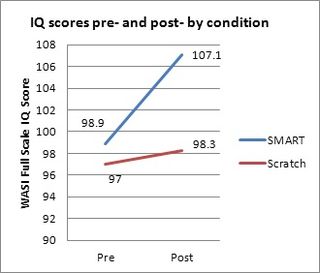
Intelligence
New Evidence for a Way to Raise Your IQ
New studies show that practising your "relational skills" will make your smarter
Posted June 20, 2016
I recently reported in this blog on a new paper of mine published in the journal Learning and Individual Differences (Cassidy et al., 2016). That paper described two experiments in which an intervention based on enhancing relational skills lead to large and consistent improvements in IQ (as measured by the WISC) and in scholastic aptitude (as measured by the DATs). These effects were created by a form of “brain training” (or intellectual skills training) that had no obvious similarity to the IQ and scholastic ability assessments. In other words, the effects of the computer-based training appear to have genuinely transferred to the intellectual skills assessed in the IQ and DATs assessments. This is the gold standard achievement for any form of brain training.
I suggested in that blog that the evidence for the positive effects of relational skills training is mounting. Readers can find out more about relational skills training here, but for now a brief summary will suffice. In essence, a relational skill refers to competence in dealing with a wide variety of abstract relationships between things in our environment. For example, understanding that the opposite of an opposite relation is a same relation, or that if A is more than B then B must be less than A, involves relational skills. These skills are likely taught across thousands of exemplars early in life, and soon generalize so that the concepts can be applied to any stimuli. According to a now large evidence base associated with Relational Frame Theory, these skills make the emergence of language and mathematical skills possible.
Hot on the heels of the Cassidy et al. paper reviewed in my last blog, two new and independent experimental studies have now appeared, that claim in various ways to show that training in relational skills (of the same type used by Cassidy et al.) can increase IQ and various scholastic skills. A third paper from another independent laboratory reporting on a case study has also been published. These studies used different experimental designs to the Cassidy et al. study and improve upon it in various ways.
The first of these studies has just appeared in the British Journal of Educational Psychology. The study by Hayes and Stewart (2016) employed a sample of 28 children aged between 10 and 11 years. The group was split in half, and matched for baseline IQ and gender. One group was randomly assigned to online relational skills training (called SMART: Strengthening Mental Abilities with Relational Training) in which they learned to derive complex relationships between nonsense words across thousands of exemplars and using trial-by-trial feedback (e.g., Cug is the same as Vek, Vek is opposite to Mer, Mer is opposite to Gew, Is Cug the same as Gew?). The other participants were exposed to ScratchTM training; an online computer coding training programme produced by the Massachusetts Institute of Technology. Both groups received the same amount of training (29 hours) across the same schedule (several hours per week) and in the same setting.

These findings further implicate relational skills as a core feature of intellectual ability. More importantly, however, because relational skills can be so easily trained, interventions designed to enhance these skills offer the best hope yet of developing “brain training” interventions that actually work in increasing intellectual skills across a wide range of domains. To really appreciate the significance of this advancement, the children in this study, for example, experienced significant improvements in standardized reading and spelling tests, even though there was no reading or spelling trained at all as part of the SMART intervention. This is true “transfer of effect,” as has been sought after as the holy grail of brain training. For sure it is still early days and the number of studies reporting these effects is small, but the evidence is still mounting.
In another study by Tirus, Starbrink, and Jansson (2016) just now appearing in the International Journal of Psychology and Psychological Therapy, researchers investigated the effects of online SMART relational skills training on mathematical and logical reasoning skills. Twenty one Swedish high school students from first and second grade were randomly assigned to a training or no training condition. All students were assessed pre and post training using non-standardized mathematical tests and Raven’s Standard Progressive Matrices (SPM), which is a measure of reasoning ability and provides an excellent index of general intelligence according to its developer Spearman (1927). Training involved several sessions per week for 8-10 weeks. No significant differences between the groups in performance on non-standardized mathematical tests were found following training. However, a significant increase on SPM performance was observed for the experimental group and this was significantly higher for the SMART training group compared to the no training group. Moreover, the effect was not related to age of the participants or their starting SPM score. Interestingly, however, not all students completed the usual 55 stages of training involved in SMART interventions and when this was factored into analyses the effects of training were even stronger.
The Tirus at al., study was published in the same scientific journal as a recent case study in which relational skills training was used to increase the intellectual ability of a very young child. Specifically, Parra and Ruiz (2016) took two students from the same school and close in age and randomly assigned them to a training or no training condition. A boy aged 4 years, 1 month was exposed to extensive training in naming (i.e., word-object coordination relations) and in the derivation of equivalence relations (e.g., If A=B and B=C does A=C?). A girl aged 3 years, 11 months was employed as the no training control participant. The McCarthy´s Aptitudes and Psychomotricity Scale (MSCA) was used to evaluate cognitive and psychomotor development before and after training. The boy was exposed to only 8 hours of training in total across two months, but following this he showed an increase of more than 1.5 Standard deviations in the General Cognitive Index (GCI) of the MSCA (a rise from 106 to 132 points. In contrast, the control participant, showed a mere 10-point increase across the same period. Interestingly, the boy’s increase in cognitive ability was somewhat maintained at a six-month follow-up with no further training. While this study was a case study employing only a single participant, it is important because it used a different form of relational skills training to the two studies outlined above, and therefore implicates the broad utility of a relational skills enhancement approach to increasing general intelligence and cognitive function.
As I have argued for several years now in my PT blogs and in my peer-reviewed publications, a relational skills approach to intelligence and general cognitive ability offers us the best hope yet for psychologists to develop effective, well-understood and easy-to-administer interventions to help children who need affordable, automated and powerful interventions for intellectual deficit and for anyone else who simply wants to maximize their cognitive ability.

